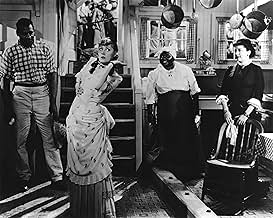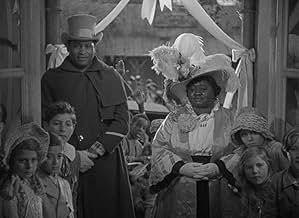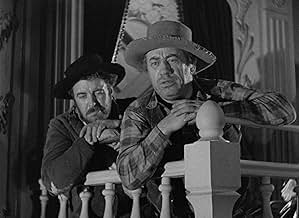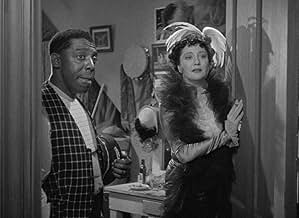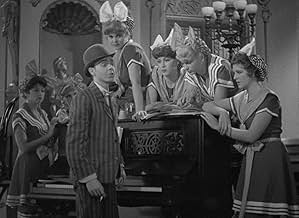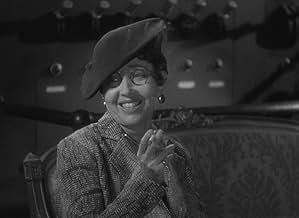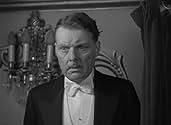Despite her mother's objections, the naive young daughter of a show boat captain is thrust into the limelight as the company's new leading lady.Despite her mother's objections, the naive young daughter of a show boat captain is thrust into the limelight as the company's new leading lady.Despite her mother's objections, the naive young daughter of a show boat captain is thrust into the limelight as the company's new leading lady.
- Awards
- 3 wins & 1 nomination total
Maude Allen
- Fat Woman
- (uncredited)
Featured reviews
This neglected gem is the closest rendering we have to what the authors originally intended to communicate in one of the most important musicals of the twentieth century.
It preserves performances by several of the original cast members, including the great Paul Robeson and Helen Morgan, singing their most famous signature tunes.
The American Musical Theater came of age with this show, which depicts domestic abuse, alcoholism & racial oppression and contains one of the most glorious musical scores ever written for any medium.
It's sad that this landmark production has not been remastered for DVD.
It preserves performances by several of the original cast members, including the great Paul Robeson and Helen Morgan, singing their most famous signature tunes.
The American Musical Theater came of age with this show, which depicts domestic abuse, alcoholism & racial oppression and contains one of the most glorious musical scores ever written for any medium.
It's sad that this landmark production has not been remastered for DVD.
Superb casting, wonderful music, and simple but literate dialogue. Paul Robeson's rendition of Old Man River is captivating, and this film is the only time I've heard the second stanza of the song which I'm sure many people would feel is not politically correct for our day. This really is an elegant production.
No question that this is the Show Boat with soul. The '51 version has some lovely chorus numbers, including a beautiful opening sequence, but it is entirely safe and a predictable piece of MGM-dom.
On this 1936 version, I found myself thinking "There isn't a dull moment in this thing".
The pacing is fast and most unsentimental. The editing is so curt as to be almost surreal, and songs are suddenly launched out of nowhere, which is curiously satisfying. To be truthful, the film's strongest cohesive stretch is its first third, after which the story-telling becomes a bit rushed (presumably) to keep the film to a tolerable length. Hattie McDaniel and Paul Robeson are magical. McDaniel's first scene is positively electric and Robeson is given to a pleasant, warm demeanor, and both he and McDaniel seem surprisingly modern during a time in which blacks were seldom portrayed as such, especially in a mixed cast.
Charles Winninger shows his Vaudeville roots here, and he does a most riveting take on the Show Boat stage, portraying a melodrama for two. His timing is perfect, and his energy is inspiring throughout the picture.
Magnolia's blackface peregrinations do ring true to the time (more 1870's, than 1930's), but the wince-worthy scenes are more those of the black river boat hands who must constantly be shown bucking and winging their way to the irresistible music, eyes rolling.
The ending has some satisfaction to it, and is lightened considerably by the fact that Gaylord Ravinal is not completely humiliated by story's end. This last scene must have somehow anticipated "A Star Is Born", with undying love and honor being its undercurrent theme.
George Gershwin once stated on network radio that Kern's [Show Boat] score was the finest light opera in American history. It may still be. Just the bridge to "Only Make Believe" is heart stopping stuff.
On this 1936 version, I found myself thinking "There isn't a dull moment in this thing".
The pacing is fast and most unsentimental. The editing is so curt as to be almost surreal, and songs are suddenly launched out of nowhere, which is curiously satisfying. To be truthful, the film's strongest cohesive stretch is its first third, after which the story-telling becomes a bit rushed (presumably) to keep the film to a tolerable length. Hattie McDaniel and Paul Robeson are magical. McDaniel's first scene is positively electric and Robeson is given to a pleasant, warm demeanor, and both he and McDaniel seem surprisingly modern during a time in which blacks were seldom portrayed as such, especially in a mixed cast.
Charles Winninger shows his Vaudeville roots here, and he does a most riveting take on the Show Boat stage, portraying a melodrama for two. His timing is perfect, and his energy is inspiring throughout the picture.
Magnolia's blackface peregrinations do ring true to the time (more 1870's, than 1930's), but the wince-worthy scenes are more those of the black river boat hands who must constantly be shown bucking and winging their way to the irresistible music, eyes rolling.
The ending has some satisfaction to it, and is lightened considerably by the fact that Gaylord Ravinal is not completely humiliated by story's end. This last scene must have somehow anticipated "A Star Is Born", with undying love and honor being its undercurrent theme.
George Gershwin once stated on network radio that Kern's [Show Boat] score was the finest light opera in American history. It may still be. Just the bridge to "Only Make Believe" is heart stopping stuff.
9B24
I was too young to see this version until well after the 1951 one had fixed a certain standard in my brain. It took a TCM rerun to open my eyes. Mind you, I still like the 1951 production very well indeed, but there is a depth of story, song, and character in this one that makes it overall the better of the two (and the "best" of a larger lot).
First, you have Paul Robeson and Helen Morgan. Both are icons who needed no dubbing no matter where or when they sang standards like "Old Man River" and "Just My Bill." Then there is Hattie McDaniel in a role largely skipped in the 1951 movie. And a greater selection of minor songs prevails as well. Indeed, the inclusion of many black people who are missing from the later film give it a unique richness.
Black and white never looked so good.
First, you have Paul Robeson and Helen Morgan. Both are icons who needed no dubbing no matter where or when they sang standards like "Old Man River" and "Just My Bill." Then there is Hattie McDaniel in a role largely skipped in the 1951 movie. And a greater selection of minor songs prevails as well. Indeed, the inclusion of many black people who are missing from the later film give it a unique richness.
Black and white never looked so good.
10preppy-3
The BEST version ever of the musical. It follows a show boat and the family that runs it through three generations concentrating on Magnolia (Irene Dunne) and her husband Ravenel (Allen Jones).
Some people have complained that Dunne's high-pitched singing voice is TOO high-pitched...they're not completely wrong. Still she sings in tune and her "Make Believe" duet with Jones is just great. Actually all the songs are great and belted out by the cast--highlights are "Can't Help Lovin' That Man", "Bill" and the great Paul Robeson doing "Old Man River". The movie also is very faithful to the stage play--it has almost all the songs and manages to fit a 3 hour play into a 2 hour film. The last section with Kim seems rushed but that's understandable.
Dunne is just great as Magnolia--very sweet and lovable. The only strange point is her dancing to "Can't Help..."--the dress is way too constricting and she has a strange look on her face. Jones is wooden but but has a wonderful singing voice. Helen Morgan was taken from the stage show to recreate Julie. She stops the movie TWICE with "Can't Help..." and "Bill". She has a beautiful voice and is a superb actress. Her character disappears completely halfway through...but it's the same in the stage play. In the book her character ends up working in a house of prostitution--there was NO way they could have gotten that on the screen back in 1936! Everybody else is great and the movie moves very quickly.
It's much better than the 1950s version. The 50s version IS in color and opens with a great number...but most of the singing is overdubbed, the story is brutally cut down and "Can't Help..." is thrown away!
This has it all over that one. Also director James Whale reportedly liked this one above all his other films--he did a few other little films like "Frankenstein" and "Bride of Frankenstein"! Beautiful songs, some truly lovely photography (the moonlight scenes on top of the showboat are dreamlike) and a quick story. Just simply one of the great Hollywood musicals. A must see!
Some people have complained that Dunne's high-pitched singing voice is TOO high-pitched...they're not completely wrong. Still she sings in tune and her "Make Believe" duet with Jones is just great. Actually all the songs are great and belted out by the cast--highlights are "Can't Help Lovin' That Man", "Bill" and the great Paul Robeson doing "Old Man River". The movie also is very faithful to the stage play--it has almost all the songs and manages to fit a 3 hour play into a 2 hour film. The last section with Kim seems rushed but that's understandable.
Dunne is just great as Magnolia--very sweet and lovable. The only strange point is her dancing to "Can't Help..."--the dress is way too constricting and she has a strange look on her face. Jones is wooden but but has a wonderful singing voice. Helen Morgan was taken from the stage show to recreate Julie. She stops the movie TWICE with "Can't Help..." and "Bill". She has a beautiful voice and is a superb actress. Her character disappears completely halfway through...but it's the same in the stage play. In the book her character ends up working in a house of prostitution--there was NO way they could have gotten that on the screen back in 1936! Everybody else is great and the movie moves very quickly.
It's much better than the 1950s version. The 50s version IS in color and opens with a great number...but most of the singing is overdubbed, the story is brutally cut down and "Can't Help..." is thrown away!
This has it all over that one. Also director James Whale reportedly liked this one above all his other films--he did a few other little films like "Frankenstein" and "Bride of Frankenstein"! Beautiful songs, some truly lovely photography (the moonlight scenes on top of the showboat are dreamlike) and a quick story. Just simply one of the great Hollywood musicals. A must see!
Did you know
- TriviaSpecial permission had to be granted from the Hays Office in order to retain the famous miscegenation (interracial marriage) sequence in the movie. Miscegenation was banned as a film subject, and had been excluded from Show Boat (1929).
- GoofsWhen Joe begins to sing "Ol' Man River", he picks up a board and begins to whittle it. He slices off two pieces, and then the camera switches to an oblique shot, but now the board is whittled to a slender rod.
- Crazy creditsIn the opening credits, there is a cardboard cutout display of a show boat parade, with cutout paper townspeople watching it, on a moving turntable. The parade revolves past the camera carrying cardboard banners on which are printed the title and other credits. Most of the parade figures are simply figures, but among them cutouts of Paul Robeson and Helen Morgan can be seen. (The appearance of these figures does not coincide with the appearance of their names onscreen.) In the background shadows of a paddlewheel and a riverboat can be seen.
- ConnectionsFeatured in The All Talking, All Singing, All Dancing Show (1973)
- SoundtracksCotton Blossom
(1927) (uncredited)
Music by Jerome Kern
Lyrics by Oscar Hammerstein II
Sung by offscreen mixed chorus (during opening credits) and in opening scene by mixed chorus of dock workers
Details
- Release date
- Country of origin
- Language
- Also known as
- Edna Ferber's Show Boat
- Filming locations
- Production company
- See more company credits at IMDbPro
- Runtime
- 1h 53m(113 min)
- Color
- Aspect ratio
- 1.37 : 1
Contribute to this page
Suggest an edit or add missing content

